Key takeaways:
- Making fine dining reservations involves etiquette and attention to detail, significantly enhancing the overall dining experience.
- Clear cancellation policies protect both restaurants and guests, fostering trust and understanding in the dining relationship.
- Effective communication during cancellations can lead to empathetic responses from restaurants, turning disappointments into opportunities for rebooking.
- Flexibility in timing and staying informed about restaurant promotions can enhance the chances of securing a desirable table again after a cancellation.

Understanding fine dining reservations
When I think about fine dining reservations, I can’t help but recall my first experience at a Michelin-starred restaurant. I learned quickly that making a reservation isn’t just about securing a table; it’s an essential component of the entire dining experience. There’s an unspoken etiquette involved that elevates the anticipation of the meal, making it feel special right from the start.
As I navigated the reservation process, I realized the importance of timing. Many fine dining establishments fill up weeks in advance, especially on weekends or special occasions. Have you ever felt that rush of excitement after finally getting that coveted reservation? It’s like receiving an invitation to an exclusive club; there’s a sense of validation and importance that comes with it.
Moreover, I’ve found that details matter immensely during the reservation process. Informing the staff about any dietary restrictions or special celebrations can make a huge difference. Just last month, I mentioned a friend’s birthday when booking a table, and they surprised us with a beautifully crafted dessert to celebrate. It’s these thoughtful touches that transform a mere meal into a cherished memory.
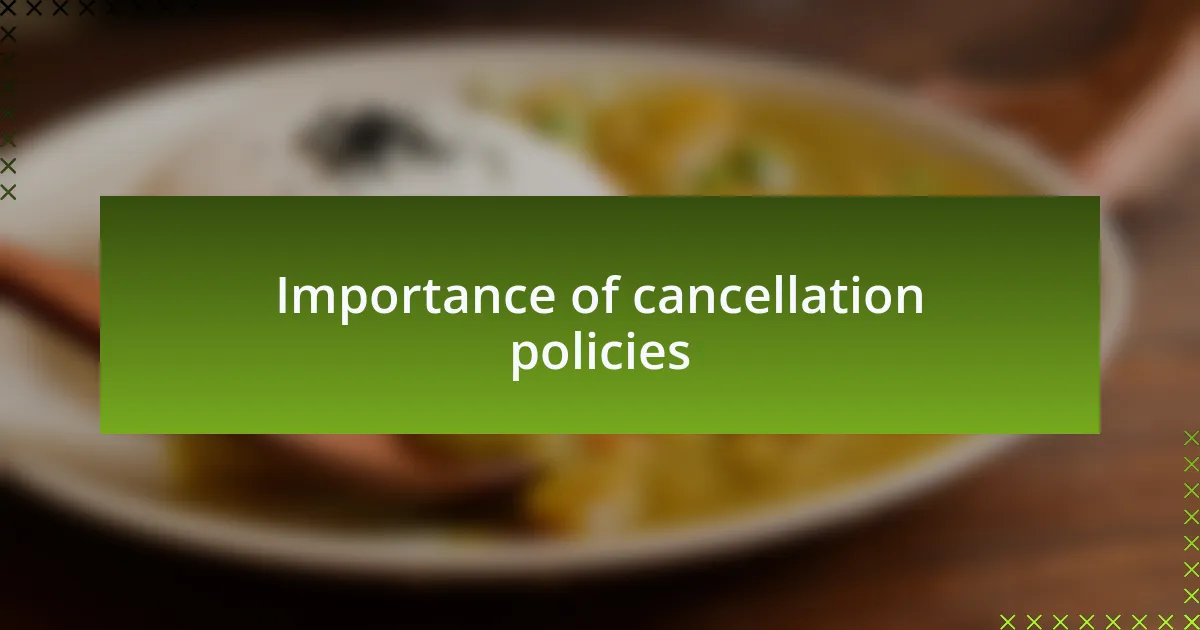
Importance of cancellation policies
When I consider cancellation policies in fine dining, I see them as a necessary framework that protects both the restaurant and the guests. Having a clear policy in place not only sets expectations but also ensures that the restaurant can manage its resources effectively. Just imagine arriving at an upscale venue only to find it fully booked because someone didn’t respect their reservation commitment; it can throw off the entire evening, right?
I remember a time when an unexpected event forced me to cancel a reservation at a popular spot. The restaurant’s reasonable policy allowed me to notify them without any penalty, which showed me how much they valued customer relationships. This experience made me appreciate establishments that prioritize flexible and understanding cancellation practices, as it creates a sense of trust and empathy in the dining experience.
Moreover, the financial implications of no-show diners can be significant for fine dining establishments. A cancellation policy helps mitigate potential revenue loss, allowing chefs and staff to prepare accordingly. Have you thought about how a last-minute cancellation affects the entire team behind the meal? It’s not just about one less customer; it impacts the kitchen, the service staff, and ultimately the overall atmosphere that diners cherish.
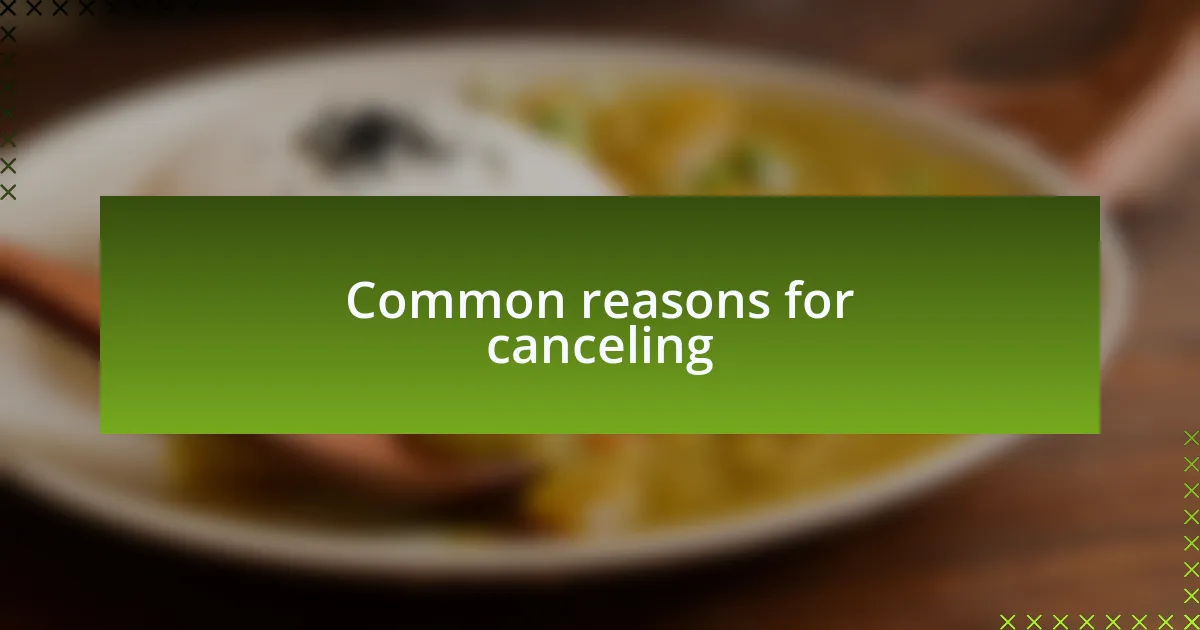
Common reasons for canceling
Common reasons for canceling can vary widely, but one frequent cause is a sudden change in personal circumstances. I recall a time when a friend had to cancel our planned dinner because of a family emergency. It’s tough when life throws unexpected challenges your way, and while it was disappointing, I appreciated the importance of understanding in those situations. It led me to realize how vital flexibility is in the restaurant’s cancellation policy.
Another common reason is illness. I had to cancel a reservation once after catching a nasty cold. I felt terrible about it, especially knowing how much effort goes into preparing for each service. It’s moments like these that highlight the restaurant’s empathy; a kind and understanding response can make a huge difference in how customers feel about rescheduling or returning.
Lastly, changes in travel plans often lead to cancellations. I remember planning a special dinner while traveling for work, but my meeting got extended, eliminating my chance to enjoy that delightful culinary experience. When this happens, it’s crucial for restaurants to have a system in place that accommodates last-minute changes while still protecting their interests. How would you feel if a hefty penalty followed an unavoidable change in plans? It’s always best to find a balance that preserves the spirit of fine dining without creating undue stress for guests.
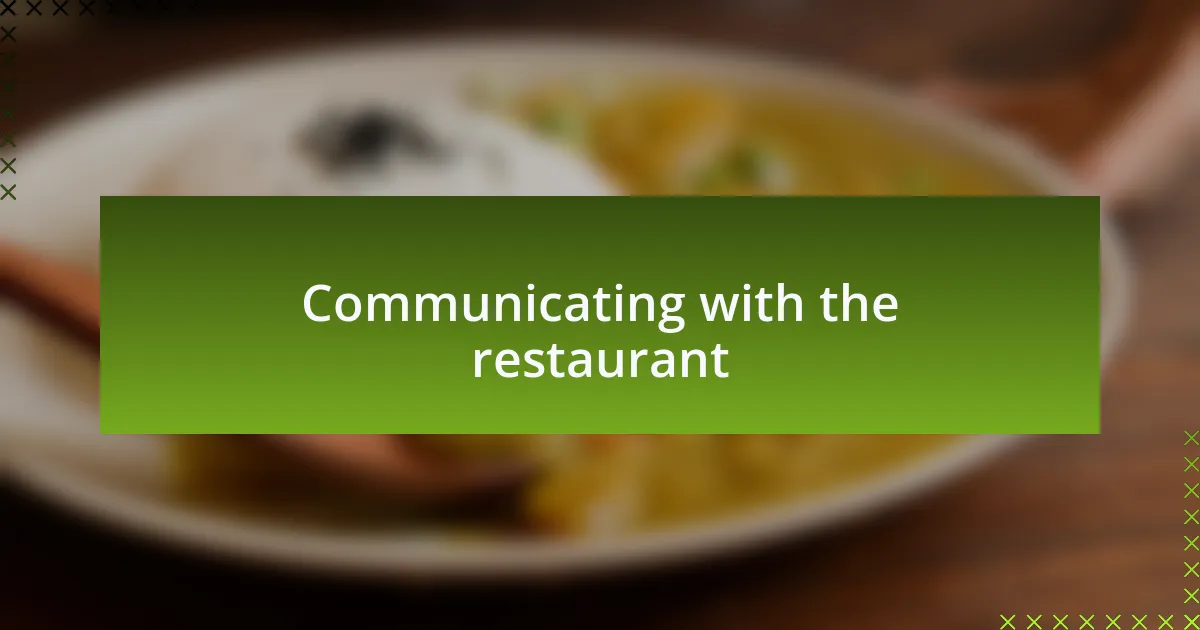
Communicating with the restaurant
When it comes to canceling a reservation, how I communicate with the restaurant can truly set the tone for the interaction. I remember one instance when I had to cancel last minute; I picked up the phone instead of sending an email. Speaking directly with someone allowed me to explain my situation more thoroughly, and I felt an immediate sense of relief when I received a compassionate response. There’s something about human connection that smoothes the edges of disappointment.
I always find it helpful to have my reservation details handy when I call. I recall calling a restaurant once and having them ask for my reservation number. It made the process much smoother and saved me from feeling flustered. By being prepared, I not only made it easier for them but also showed respect for their time. It’s a small gesture, but it can lead to a more understanding conversation.
I often ask if I could potentially reschedule rather than outright canceling. In a recent experience, I shared my scenario with the restaurant, and to my delight, they offered me a chance to rebook at a later date with no penalty. How refreshing is that? It feels great knowing that a simple call can turn a frustrating situation into an opportunity for another culinary adventure. Communication is a powerful tool, and when used thoughtfully, it can transform cancellations into new possibilities.
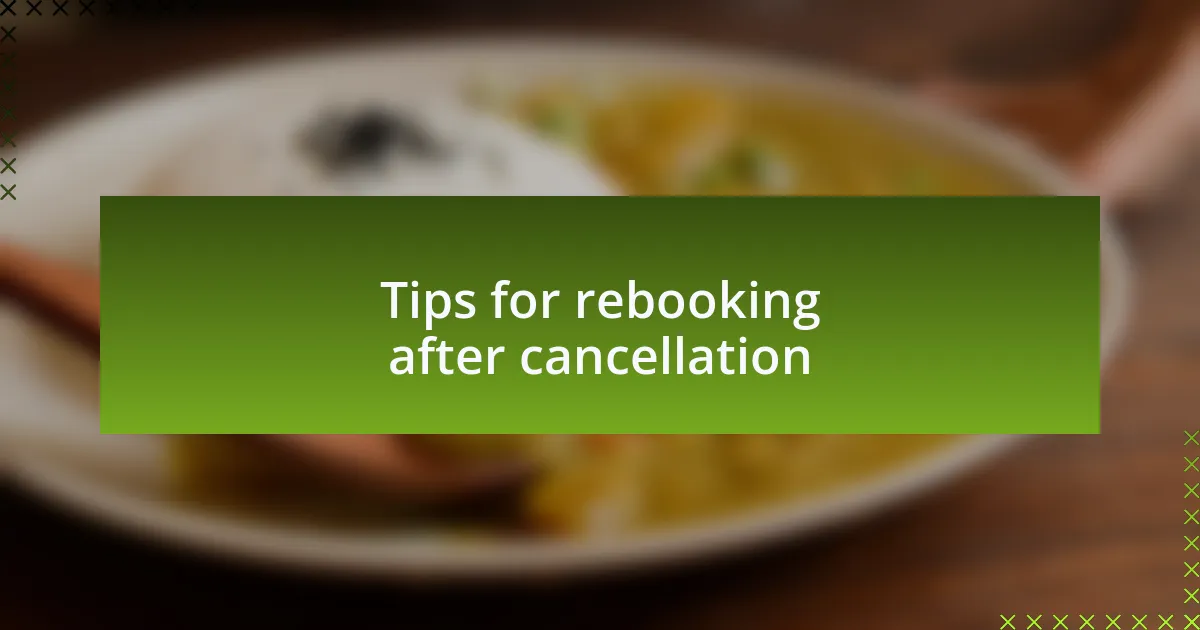
Tips for rebooking after cancellation
After canceling, one of the best strategies I’ve found is to ask about their availability for rebooking during the same call. Just the other day, after a tough cancellation due to unexpected plans, I asked the host about alternative dates. To my surprise, they were able to offer me a reschedule on a quieter evening, which not only eased my disappointment but also opened up an experience I hadn’t even considered before.
Timing can be everything when rebooking. I learned that if I’m flexible with my dates and willing to dine during off-peak hours, there’s often a better chance to snag that sought-after table. When I opted for a Tuesday evening instead of a weekend, I found myself enjoying a more intimate dining experience, not crowded by the usual rush. Plus, I felt like I had the staff’s undivided attention that night; it can really elevate the experience!
It’s also worth signing up for the restaurant’s newsletter or following them on social media after canceling. Often, they share special promotions or events that might catch your interest. I remember discovering a special tasting event through their Instagram page a week after I had to cancel. Not only did I manage to rebook, but I also got to savor a unique menu I would have otherwise missed. Have I learned that a cancellation can lead to new culinary discoveries? Absolutely!
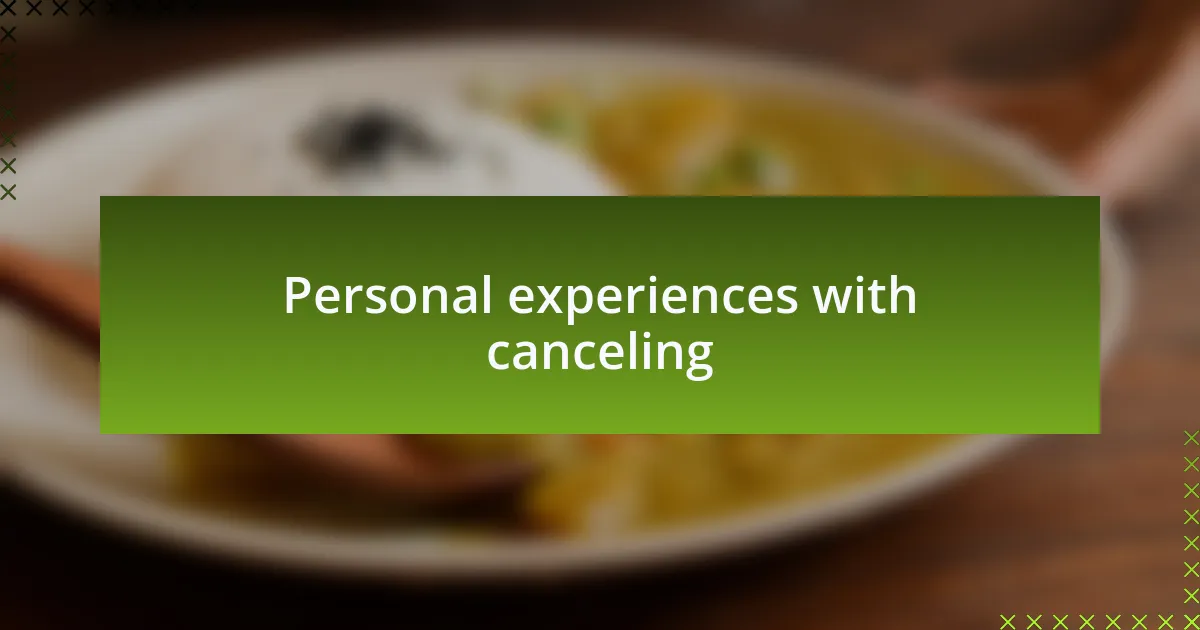
Personal experiences with canceling
Canceling a reservation can sometimes feel like a weight on my shoulders, especially when I’ve been looking forward to that indulgent meal. I recall once having to cancel a dinner that was supposed to be a celebration with friends. It felt disappointing, not only for myself but for them, too. In that moment, I realized it wasn’t just about the meal, but the shared experience that I was letting go of.
The way I approach a cancellation often depends on how invested I feel in the dining experience. For instance, I once had to cancel at a restaurant I’d saved for a special occasion. When I called, I expressed how much it meant to me. Surprisingly, the manager offered me a gift certificate for a future visit, which transformed my disappointment into gratitude. Have you ever thought about how sharing your emotional connection with a restaurant can lead to unexpected kindness?
I’ve also noticed that the manner in which I convey my cancellation can impact the outcome. There was a time I had to cancel last minute due to a family emergency. I didn’t just inform them; I explained my situation and was met with understanding. They not only wished me well but also reassured me that I could easily reschedule. The empathy I felt in those moments made me appreciate the establishment even more, shaping my future choices in fine dining.